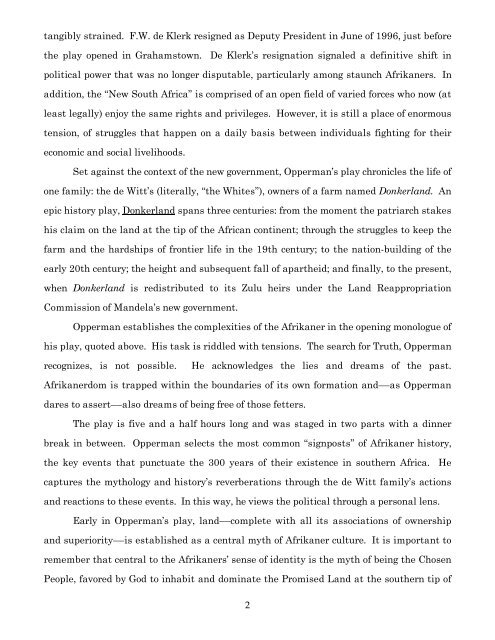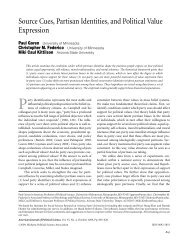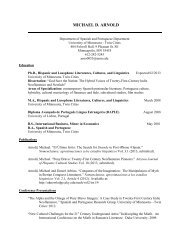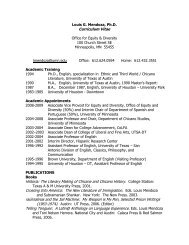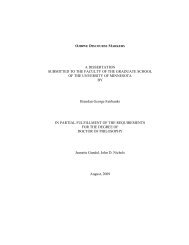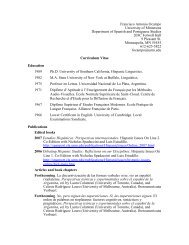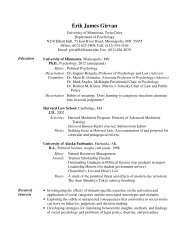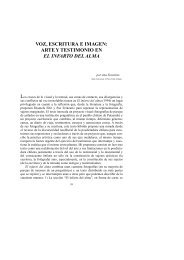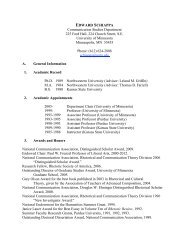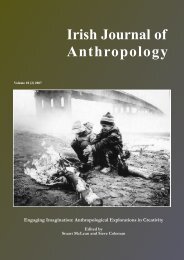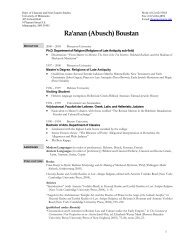De/Re-Constructing Borders - University of Minnesota
De/Re-Constructing Borders - University of Minnesota
De/Re-Constructing Borders - University of Minnesota
You also want an ePaper? Increase the reach of your titles
YUMPU automatically turns print PDFs into web optimized ePapers that Google loves.
tangibly strained. F.W. de Klerk resigned as <strong>De</strong>puty President in June <strong>of</strong> 1996, just before<br />
the play opened in Grahamstown. <strong>De</strong> Klerk’s resignation signaled a definitive shift in<br />
political power that was no longer disputable, particularly among staunch Afrikaners. In<br />
addition, the “New South Africa” is comprised <strong>of</strong> an open field <strong>of</strong> varied forces who now (at<br />
least legally) enjoy the same rights and privileges. However, it is still a place <strong>of</strong> enormous<br />
tension, <strong>of</strong> struggles that happen on a daily basis between individuals fighting for their<br />
economic and social livelihoods.<br />
Set against the context <strong>of</strong> the new government, Opperman’s play chronicles the life <strong>of</strong><br />
one family: the de Witt’s (literally, “the Whites”), owners <strong>of</strong> a farm named Donkerland. An<br />
epic history play, Donkerland spans three centuries: from the moment the patriarch stakes<br />
his claim on the land at the tip <strong>of</strong> the African continent; through the struggles to keep the<br />
farm and the hardships <strong>of</strong> frontier life in the 19th century; to the nation-building <strong>of</strong> the<br />
early 20th century; the height and subsequent fall <strong>of</strong> apartheid; and finally, to the present,<br />
when Donkerland is redistributed to its Zulu heirs under the Land <strong>Re</strong>appropriation<br />
Commission <strong>of</strong> Mandela’s new government.<br />
Opperman establishes the complexities <strong>of</strong> the Afrikaner in the opening monologue <strong>of</strong><br />
his play, quoted above. His task is riddled with tensions. The search for Truth, Opperman<br />
recognizes, is not possible. He acknowledges the lies and dreams <strong>of</strong> the past.<br />
Afrikanerdom is trapped within the boundaries <strong>of</strong> its own formation and––as Opperman<br />
dares to assert––also dreams <strong>of</strong> being free <strong>of</strong> those fetters.<br />
The play is five and a half hours long and was staged in two parts with a dinner<br />
break in between. Opperman selects the most common “signposts” <strong>of</strong> Afrikaner history,<br />
the key events that punctuate the 300 years <strong>of</strong> their existence in southern Africa. He<br />
captures the mythology and history’s reverberations through the de Witt family’s actions<br />
and reactions to these events. In this way, he views the political through a personal lens.<br />
Early in Opperman’s play, land––complete with all its associations <strong>of</strong> ownership<br />
and superiority––is established as a central myth <strong>of</strong> Afrikaner culture. It is important to<br />
remember that central to the Afrikaners’ sense <strong>of</strong> identity is the myth <strong>of</strong> being the Chosen<br />
People, favored by God to inhabit and dominate the Promised Land at the southern tip <strong>of</strong><br />
2


